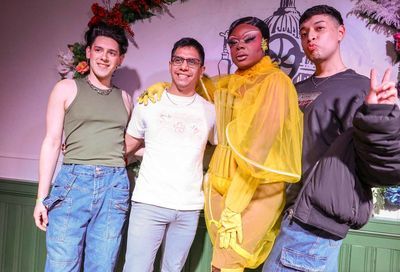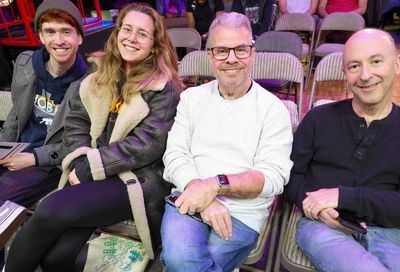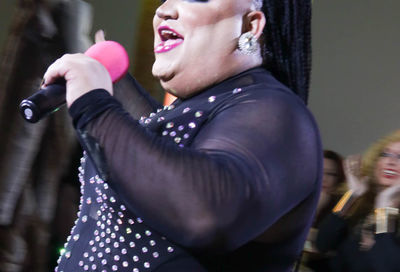She Males
With men in the women's roles, 'Romeo and Juliet' feels like a novelty performed by a troupe of Elizabethan drag queens
To borrow from Victor/Victoria, Shakespeare Theatre Company’s Juliet is a man, pretending to be a woman…. Oh. Wait. That’s it. No need to borrow from Victor/Victoria at all.
Which is good. Because Victor/Victoria was all about gender bending, which is not what Shakespeare Theatre Company’s new all-male production of Romeo and Juliet is about. The point of the show is not that men are playing the female roles, but instead that this is Romeo and Juliet being presented as it would have been cast at the time it was written.

Romeo and Juliet
In Shakespeare’s time — as we all learned from our high school English class or slightly less academically through watching Gwyneth Paltrow in the film Shakespeare in Love — female roles were played by men because women were not allowed to take the stage.
So it was an all-male cast that would have told the story of Romeo and Juliet, the children of the feuding Capulet and Montague families who fall fatally in love with one another. Romeo, Juliet, the Lords and Ladies Montague and Capulet, Juliet’s grim cousin Tybalt and her Nurse. Romeo’s loyal and ill-fated friend Mercutio. All men.
But here is the difference between then and now. It is no longer common for men to play women’s roles. More often than not, when male actors don a wig and gown it’s for a punchline or a wink to the audience. It’s a novelty, a gag.
Unfortunately this cycle is left largely unbroken by the Shakespeare Theatre Company’s Romeo and Juliet as directed by David Muse.
It’s not that the approach completely fails. In fact, James Davis (Juliet) and Finn Wittrock (Romeo) make for a genuinely lovely pair of star-crossed lovers. First, and a point that is sometimes lost, is that both actually look as though they could be teenagers. This is particularly true in the case of Davis’ Juliet, who stands a good head taller than her Romeo and is all legs and arms and empty bodice. This is a Juliet still in that awkward stage some girls experience when they don’t quite yet fit into themselves.
Their ages are further accentuated by the decision to have both actors throw the occasional teenage temper tantrum. These are not disconnected Shakespearean actors delivering lines from some dusty text. These are, essentially, a pair of horny middle school students with severe perspective issues. Don’t forget, the whole reason Romeo even meets Juliet is because he crashes her family’s party hoping to hook up with the lovely and quickly forgotten Rosaline.
It’s not to say that the performances delivered by Davis and Wittrock are flawless. Both veer dangerously close to moments of overdoing it, an issue that threads its way throughout the production.
The insistence on having so many of the actors literally pantomime the meaning of Shakespeare’s text (making a sweeping motion with one’s hands to indicate the outline of a pregnant belly when talking about how ”women grow by men”) robs the play of its rhythm and cleverness. It becomes a distraction and a crutch and sells the audience short.
More critically, these broad demonstrations are a serious problem in the portrayals of the other female characters. The women dissolve into a swirl of skirts, a rustle of taffeta and affected hand motions that are exceptionally false. It’s impossible to surrender disbelief because they are so clearly men trying to play female characters without trying to actually portray real, live women. They seem more a troupe of Elizabethan drag queens.
Without question, Romeo and Juliet is an exceptionally beautiful production. Set designer Scott Bradley has created a jewel of a stage design that opens and unfolds like a series of carefully fitted velvet-lined boxes. The visual is nicely complemented by the original music of The Broken Chord Collective, whose work somehow manages to call to mind both the American South and the ballad singing most often associated with the time of Shakespeare. It is a richly textured sound that settles quite naturally into the play.
Ultimately, however, Shakespeare Theatre Company’s Romeo and Juliet is weighed down by the elephant that it brings onto the stage. Dress or no, we simply can’t pretend that it’s not an elephant.
To Oct. 12
Round House
$25-$60
240-644-1100
www.round-house.org
Watch even an hour of Food Network or pick up any of the dozens of food-based magazines crowding the shelves at your nearest bookstore and you’ll find someone advocating keeping your food as close to its original form as possible. A little olive oil, some sea salt, some fresh pepper and walk away. Let it be what it’s going to be.
This is the case, with beautiful results, with Round House Theatre’s stage version of How the Garcia Girls Lost Their Accents. Clean and simple, and told through a series of well-paced vignettes, Karen ZacarÃas’ adaptation draws on the essence of Julia Alvarez’s novel and avoids becoming mired in attempting a slavish page-by-page transcription. This is a play, not a reading, and it blossoms as such.
Born to a prominent family in the Dominican Republic during the dictatorship of Trujillo, the Garcia family is forced to flee to the United States. Like the novel, the play starts with the family gathered to celebrate the family patriarch’s 70th birthday and works its way back to that fateful day when they were forced from their home.
The well-crafted script is delivered by a strong cast, particularly Gabriela Fernandez-Coffey as our guide Yolanda and Veronica del Cerro as Sophia, the youngest daughter and Garcia wild child. Together with Sheila Tapia and Maggie Bofill, these four actresses form a powerful family of talent who are a joy to watch.
Support Metro Weekly’s Journalism
These are challenging times for news organizations. And yet it’s crucial we stay active and provide vital resources and information to both our local readers and the world. So won’t you please take a moment and consider supporting Metro Weekly with a membership? For as little as $5 a month, you can help ensure Metro Weekly magazine and MetroWeekly.com remain free, viable resources as we provide the best, most diverse, culturally-resonant LGBTQ coverage in both the D.C. region and around the world. Memberships come with exclusive perks and discounts, your own personal digital delivery of each week’s magazine (and an archive), access to our Member's Lounge when it launches this fall, and exclusive members-only items like Metro Weekly Membership Mugs and Tote Bags! Check out all our membership levels here and please join us today!























